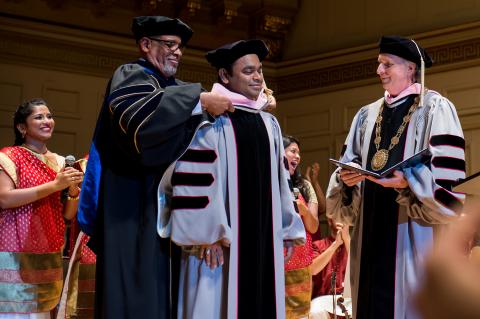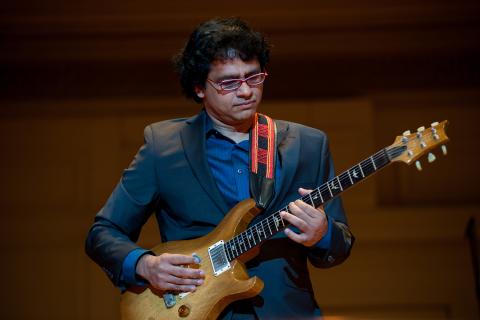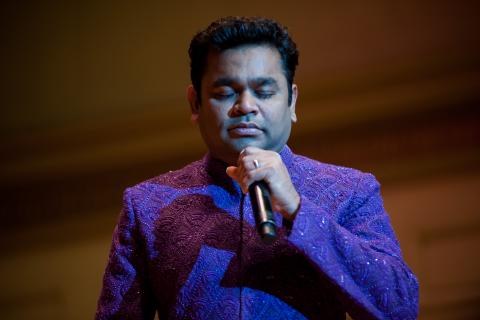A.R. Rahman and Berklee Pack Symphony Hall

Faculty members Eugene Friesen and Annette Philip flank A.R. Rahman during final bows at the end of the October 24 concert. Performers from the Berklee Indian Ensemble stand in the back row.
Mike Ritter

Berklee senior VP and provost Larry Simpson places the doctoral collar on A.R. Rahman before president Roger H. Brown presented the composer with a Berklee honorary doctor of music degree.
Mike Ritter

Indian-born guitarist Prasanna ’99 reprised his performance on “Desi Thoughts” from Rahman’s Million Dollar Arm score.
Mike Ritter

Rahman sang on the final song “Vande Mataram.”
Mike Ritter
The October 24, 2014, tribute concert and honorary doctorate presentation to A.R. Rahman, India’s foremost film composer and songwriter, sent a surge of excitement through the Berklee campus to Boston’s Indian community and beyond. When word got out of a concert of Rahman’s music at Boston’s Symphony Hall to raise funds for a Berklee scholarship in his name, tickets to the show sold out six weeks before the event.
American audiences may be familiar with Rahman’s music through such films as Slumdog Millionaire, The Hundred-Foot Journey, 127 Hours, and other English-language films, but millions of moviegoers throughout India and other Asian nations are fans of his huge catalog of songs and scores for more than 140 films. Nicknamed “The Mozart of Madras,” Rahman has won two Academy Awards and numerous honors and awards in India and elsewhere, and sold 150 million albums.
Faculty member Annette Philip ’09 and Berklee City Music staff member Clint Valladares ’98 (both of whom grew up in India) were key in facilitating the Rahman visit. Philip and Valladares are the prime movers behind the Berklee India Exchange, which fosters mentorships and cultural connections between Berklee students and top figures in the Indian entertainment industry. Philip also served as the music director and pianist for the concert of Rahman’s music that was performed by some 90 Berklee student and faculty musicians and dancers. Philip and Valladares, the concert’s coproducers, were part of a group that made the concert an extraordinary event. Deserving special mention are faculty members Eugene Friesen, who conducted the Berklee World Strings, and Matthew Nicholl, who oversaw the preparation of the orchestral parts for the arrangements penned by eight student and faculty arrangers.
The concert featured 16 vocal and instrumental selections, including five medleys from various soundtracks. The exotic melodies and instrumentation of Rahman’s music captivated the audience from the downbeat. The composer was featured on the first selection, the theme from Bombay, playing the melody using a breathy wooden flute patch on the Continuum Fingerboard synthesizer controller. The instrument’s keyless, touch-sensitive surface permitted Rahman to play in between the pitches of the equal-tempered scale and add vibrato, swooping glissandi, and other critical components of his music.
Among the many concert highlights were “Chaiyya Chaiyya” from the Hindi film Dil Se, featuring an insistent drumbeat and the 16 voices of the Berklee Indian Ensemble singing dense, jazzy vocal harmonies. Indian-born guitarist Prasanna ’99, a leading exponent of Carnatic music on the electric guitar, was the guest soloist on “Desi Thoughts.”
Prasanna reprised the extensive string slides and microtonal bends that he played on the cue from Rahman’s Million Dollar Arm score. A second Indian guest, teen bass virtuoso Mohini Dey, joined Prasanna for the medley of “Thee Thee” and “Malargale.” Venturing into funk and fusion territory, she slapped her bass strings and tapped high chord voicings with her right hand in addition to trading solos with Prasanna. Throughout the program, the lead and backing vocalists deftly negotiated the subtle nuances of Rahman’s emotive and rhythmically complex melodies with lyrics in Tamil and other Indian languages. Student musicians playing sarod, tabla drums, harmonium, Chinese woodwind instruments, and sundry percussion instruments, blended seamlessly with their colleagues playing the guitars, brass, woodwind, orchestral, and percussion instruments of Western music, highlighting Rahman’s expansive musical vision. (See the Expert Testimony interview with Rahman on page 28.)
In the honorary doctorate presentation, president Roger Brown noted that Rahman’s music transcends national borders. “His capacity to draw from a vast global palette has birthed thrilling collaborations with artists such as Nusrat Fateh Ali Khan, Andrew Lloyd Webber, and the Black Eyed Peas, just to name a few,” Brown said.
After accepting the degree, Rahman thanked Berklee and the audience for supporting a scholarship in his name that will provide opportunities for Indian students to study at Berklee. Then, gesturing to the musicians onstage, he elicited applause in saying to the crowd, “Amazing band, isn’t it?”
He noted that when considering college, he was encouraged to enroll at Berklee by Indian violin master L. Shankar, with whom he was touring. A few years later, Rahman was preparing to come to Berklee when Indian film director Mani Ratnam asked him to score his film Roja. “He asked me, ‘Which will it be, Berklee or Roja?’” Rahman said. “I chose Roja. But now in the full circle of life, I am here being honored by Berklee.” Ultimately, Roja became a classic throughout Asia, and Rahman’s first film score and soundtrack went platinum.
Some 60,000 viewers worldwide watched the Symphony Hall concert, which was streamed online as well. The event raised $250,000 for the A.R. Rahman scholarship at Berklee. This one-time scholarship will soon be awarded to an outstanding musician of Indian origin.
